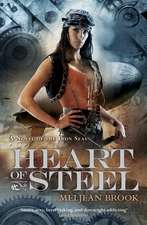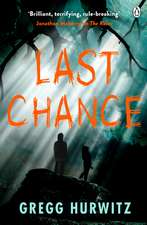Final Impact: Axis of Time Trilogy
Autor John Birminghamen Limba Engleză Paperback – 31 dec 2006
–S. M. Stirling, author of Island in the Sea of Time
In the year 2021 a multinational fleet–experimenting with untested weapons technology–pitched through time, crash-landing in 1942. The world is thrown into chaos as Roosevelt, Hitler, Churchill, Tojo, and Stalin scramble to adapt to new, high-tech killing tools, and twenty-first-century ways of war.
For “uptimers” like Britain’s Prince Harry and the men and women who serve aboard the supercarrier USS Hillary Clinton, war is a constant struggle with their own downtime allies, who are mired in ignorance and bigotry.
As the Allies counter the Nazi assault and set off for the coast of France, Japan begins to buckle, soon every battle will be played out in a lethal dance of might and intelligence, unholy alliances and desperate gambles, and each clash will be fought with the ultimate weapon; knowledge from the future.
Thanks to the historical records, all sides know that two superpowers will emerge, while the losers will be pounded into submission. But time has shifted on its axis, so none know who will survive, or how peace will take hold in a world turned upside down. These are the questions that John Birmingham brilliantly answers in his critically acclaimed adventure of war and imagination.
Praise for John Birmingham’s Weapons of Choice
“Birmingham’s enthralling battleground mixes provocative historical fiction and socially conscious futurism.”
–Entertainment Weekly
“High-tech intrigue and suspense similar to the works of Tom Clancy.”
–Library Journal
| Toate formatele și edițiile | Preț | Express |
|---|---|---|
| Paperback (2) | 112.81 lei 3-5 săpt. | |
| Del Rey Books – 31 dec 2006 | 112.81 lei 3-5 săpt. | |
| Penguin Books – 3 dec 2008 | 113.80 lei 6-8 săpt. |
Preț: 112.81 lei
Nou
Puncte Express: 169
Preț estimativ în valută:
21.59€ • 23.54$ • 18.20£
21.59€ • 23.54$ • 18.20£
Carte disponibilă
Livrare economică 03-17 aprilie
Preluare comenzi: 021 569.72.76
Specificații
ISBN-13: 9780345457165
ISBN-10: 0345457161
Pagini: 343
Dimensiuni: 157 x 234 x 21 mm
Greutate: 0.37 kg
Editura: Del Rey Books
Seria Axis of Time Trilogy
ISBN-10: 0345457161
Pagini: 343
Dimensiuni: 157 x 234 x 21 mm
Greutate: 0.37 kg
Editura: Del Rey Books
Seria Axis of Time Trilogy
Extras
1
D-Day. 3 May 1944. 0300 hours.
In transit.
The lead helicopter hammered across the English Channel at the edge of its performance envelope, close enough to the waves that Lieutenant Gil Amundson thought he could feel a fine mist of sea spray stirred up by their passage through the darkness.
The seven men in his chalk were quiet, each alone in his own cocoon of anticipation and fear. Amundson could hear Sergeant Nunez beside him, reciting rapid-fire Hail Marys, working through a set of rosary beads in what looked to the young cavalry officer like record time. Across the cabin Private Clarke was nervously tapping his heel on the steel plating of the floor, the tempo increasing until it sounded like one of those rock-and-roll drummers. Then he'd curse, punch himself on the leg, and go still for a moment before starting all over again.
On either side of him a couple of the boys were dozing fitfully. Or at least pretending to.
That's how it went the whole way across. Each man playing out what might be his last hour as he saw fit. Some checked their equipment, before checking their buddy's. Some leaned over to get a view of the invasion fleet as it headed for the coast. Corporal Gadsden craned his head skyward, the bulky lens of his Gen2 Starlite goggles tracking his gaze as he picked out Dakotas, gliders, Mustang night fighters, and, at one point, a squadron of Sabers miles overhead, all screaming toward France.
Amundson forced himself to go through the plan again. The rapid insertion, the assembly point for his platoon, the mental map of their objective.
He used what little space he had in the chopper to perform a set of isometric exercises, lest his butt fall asleep before they jumped into Hitler's front garden. He stretched his arms and legs and craned his neck from side to side, a full extension in each direction, which gave him a clear view of the rest of the cav squadron as it thundered toward the enemy in 132 Hueys, with another forty Cobra gunships riding shotgun.
It seemed that the demonic roar of so many engines, the great thudding of all those rotors, could surely be heard in Berlin itself. But as quickly as the thought came to him, it was gone.
A quick glance forward through the armored glass canopy revealed the firestorm that was engulfing the Pas de Calais. So much high explosive had been dropped on that small region of France, it would be a wonder if anything bigger than a flea still lived down there. There'd even been talk back in England that Ike might bust a nuke over the krauts, although Amundson doubted that. They hadn't been outfitted to fight in radioactive terrain.
That wouldn't stop the Nazis, though, he supposed. Axis Sally had been taunting the Allies for weeks now, claiming that the Reich was just waiting for them to set foot on the Continent, giving them an excuse to use the first of their many, many A-bombs. Amundson glanced down, then back at the lead elements of the great fleet headed for the beaches of Calais. At least his squadron was probably too small a target to justify the use of such a weapon.
No, they were probably just gonna get chewed to bits by German jet fighters.
Ah, screw it.
He figured the same doubts were gnawing through every man in the operation. Eisenhower himself was probably being tortured by the same sort of fears. Ever since the Transition, so much was known, but so much more was unknowable.
There was one person who didn't seem to give a shit, though, and she was sitting directly across from him. She was a civilian, but she'd seen more combat than any of them. Maybe even anyone in the whole squadron. Amundson knew a few guys who'd fought in the Pacific, but almost everyone else in the Seventh had never fired a shot-not in combat. Nor had they come under fire themselves.
But they'd trained as hard as any outfit in the world. And in one of those weird, head-spinning paradoxes, they'd learned the lessons of another
D-Day, one that had taken place on another world. Amundson knew, for instance, that a field full of French cows most likely wasn't mined, but if those cows kept staring at a bush or a hedgerow, there was probably a German hiding there. Their equipment was without a doubt the best. The poor old infantry, down in those Higgins boats, they didn't get any Starlite goggles, or even body armor. And they were still armed with the M1 Garand, not the brand-new assault rifles with integrated grenade launchers.
But even though he'd been honed to a razor's edge and was riding at the head of the most powerful cavalry unit ever assembled, Gil Amundson couldn't help but wonder. Would he crumble when the first bullet zipped past? Would he freeze up over the Landing Zone? Would he fail his men? And would he look like a coward in front of this woman who seemed not to give a damn that they were less than an hour away from certain death?
The chopper banked sharply as the dark sky to the north suddenly filled with dozens of beautiful, sinuous lines of light. Tracer fire. Where the hell had that come from? They'd been told that the air force was going to bomb the coast back to the Stone Age.
He struggled to get a view back to the rest of the squadron, which followed the lead chopper. He heard the copilot calling in a position estimate for the antiaircraft batteries and half expected to see a couple of gunships peeling away to deal with them. But everyone stayed in formation, pressing on toward the objective.
They left the lead elements of the fleet behind them. The only movement on the sea was a rippling crescent of reflected moonlight as they sped on. The pilot's voice crackled out of a speaker above Amundson's head. "We'll be over the coastline in five minutes."
Amundson looked south as four gunships pulled ahead, their job to rake the ground clear of defenders. When he looked back at the woman, she was talking to Gadsden. Or rather he was yelling something in her ear. She smiled and nodded.
Amundson felt a brief, irrational surge of jealousy. He slowly and deliberately stamped it down. She wasn't his girl, after all. They'd shared a bed in London for a couple of nights, made love in ways he hadn't thought possible-and which wouldn't have been, if he wasn't in such amazing physical shape. But she'd made it clear that she wanted nothing more than sex. She didn't even like to cuddle. The couple of times he'd tried, she had rolled on top of him, fucked him insensible, then rolled off and gone back to sleep.
When he'd told his best buddies, lieutenants Savo and Lobes, they'd stared at him like he'd just won the Kentucky Derby. And actually, it kinda bugged him, them just looking at him like he was out of his mind.
Julia Duffy was famous. And beautiful. And rumor had it that she was as rich as a Rockefeller. So if he didn't feel like sharing her bed, then Savo and Lobes reckoned they'd be more than happy to volunteer. After all, if she was good enough for the president of the United States of America-well, he'd be president someday, at least, if he survived the war-then who were they to turn her away?
Amundson caught himself staring at her just before she locked eyes with him. He glanced away guiltily.
Julia kicked him. It would have hurt if he hadn't been wearing a thick rubber knee pad.
"You and your boys, you'll be fine, Lieutenant," she called out over the noise. "Don't sweat it. You're gonna eat those fuckers alive. Garry-fuckin'-owen."
The men in his chalk roared back.
"Garryowen!"
Amundson smiled. But he felt sick in the pit of his stomach.
About three months after the Allies had retaken Hawaii, a package had arrived for Julia at The New York Times. She'd been back home for a month by then. After the slaughter on Oahu, the paper had insisted that she take a proper vacation, and to everyone's surprise she had agreed.
She'd still been with Dan at that point, but she hadn't gone out to the Zone. Hadn't even bothered to phone and tell him she was back. Mostly, she just stayed drunk.
She did manage to visit Rosanna's family, and for about three hours in their company she felt half human. But she fell apart when Poppi Ugo brought out the family album and insisted on taking her through every shot they had of Rosanna. She'd guzzled down nearly three- quarters of a bottle of grappa, crying hysterically all the time, and had passed out on the couch. She woke up at three in the morning, shivering under the Natoli family quilt, then vomited and snuck out the front door, leaving twenty dollars to cover the dry-cleaning bill. Hours later she remembered that dry cleaning as she knew it didn't exist yet.
She'd gone back to apologize, but the Natoli clan refused to hear it. They tried to talk her into staying for another 188-course dinner, but-fearing a meltdown-she had begged off and fled back to the city. The next she heard from them was when this package turned up at the Times.
The mailroom cleared about a thousand items a week for Julia. Letters from servicemen she'd written about. Cookies baked by their moms. Crayola drawings by little girls who said they wanted to grow up and be just like her. And at the other extreme, hate mail and death threats from fans of the former FBI director who blamed her for his ruin, or from nutjobs who just didn't like her. There were plenty of those. Many of them working for the same paper as her.
The package from Rosanna's family lay on her desk for about two weeks before she could bring herself to do anything about it. Worried that she might fall apart in front of her colleagues, Julia had carried the parcel back to her apartment and left it in a closet for nearly a month.
It took a fifteen-hour liquid lunch at the Bayswater before she could get it back out of the closet, and two pots of black coffee before she could take a knife to the packing tape without cutting a finger off.
She had no idea what was waiting in there. Part of her thought the Natolis might have sent the quilt over for her to clean up. But the package wasn't big enough, and when she spilled the contents of the thick, padded envelope onto her Castiglioni coffee table, a small "Oh!" escaped her, and she had to run to the bathroom to be sick again.
The snoring man in her bed stirred but didn't wake as she lost a whole day's worth of Manhattans and finger food in the bathroom. She sucked a few mouthfuls of cold water straight from the faucet, thought about taking a shower, and decided to go without, lest she wake up the asshole in her bedroom.
Walking very unsteadily back into the lounge area of her huge open living space, Julia studied the sad collection of personal effects that lay on the tabletop. Rosanna's flexipad and a dozen data sticks, a traditional leather-bound diary, some jewelry, an Hermès scarf, her imitation Bordigoni handbag, a wristwatch, a small piece of notepaper, and some cosmetics.
Julia stared at the pile of detritus for a long time while her stomach threatened to rebel again. She tried to think, but it was as though her mind could gain no traction. It kept slipping over the sight in front of her, refusing to latch on to anything in particular. After a few minutes, with a shaking hand, she picked up the piece of paper.
Rosanna's great auntie Tula had written on it in her large, looping style.
Dearest Julia.
A very kind Captain Schapelli from the army came by today with a large carton of little Rosie's belongings recovered from Hawaii. She had made out a will and hidden it in her apartment. The Japanese killed everyone there, I hear, but they never found Rosie's last testament or the things she had hidden away. Captain Schapelli, a lovely boy, but Jewish, insisted that we send them to you. He's quite a fan. There is a larger box, which we could not afford to send because of the postage being what it is these days, and Captain Schapelli says there are some things in there for you, too. We would love to have you around for dinner again, and you could collect the things little Rosie wanted you to have. Please do call or write.
Love and best wishes, Tula
Eight months later Julia sat braced against the forward bulkhead of the lead chopper. It was the Seventh Cav's first charge since they'd gone tearing around after Pancho Villa.
She adjusted a shoulder pad as Corporal Gadsden yelled something into her ear about a couple of London barmaids he'd screwed a couple of weeks earlier. What a dick, she thought, but she just smiled and nodded.
Her titanium weave armor was way past its expiration date. It'd been repaired time and again with reactive matrix panels and patches bought, borrowed, and occasionally stolen from other twenty-first- century reporters who didn't share her enthusiasm for front-line action. So it had taken on the appearance of a camouflage quilt. The ballistic plating was brand new, though, thanks to Rosanna, who had left all her own mostly unused equipment to her friend.
A brief, sad smile died at the edge of Julia's mouth.
Still lookin' out for me, babe.
The copilot's voice crackled inside her powered helmet. "Ten minutes to insertion."
Amundson repeated the call and held up both hands. Everyone nodded.
Julia could see that the young officer was trying to control his nerves. She guessed it had less to do with fear of being killed than with fear of fucking up and letting everyone down. He was a sweet kid, really. They'd had some good times in London, even if he was a little clingy. In fact, thinking about it, she'd spent more time with Gil than any man she'd been with after Dan had died.
And now the poor kid was shitting himself.
"You and your boys, you'll be fine, Lieutenant," she yelled over the uproar. "Don't sweat it. You're gonna eat those fuckers alive. Garry fuckin' Owen."
She punched the air between them.
The men grinned fiercely and called out the Seventh Cav's war cry.
As the troopers began yet another round of equipment checks, Julia performed her own precombat routine. A software aid scanned all her built-in combat systems, most of which were useless now anyway for want of tac-net coverage. She unsheathed her knife. The monobonded carbon blade was a dull gray, but more than razor sharp. Her Sonycam was powered up and loaded with four blank data sticks-again thanks to Rosanna-enough for two days' continuous filming. Her medikit was an eccentric mix of original 21C supplies, some AT stuff, and some plain old-fashioned 'temp gear-assorted twentieth-century items she'd scavenged here and there.
D-Day. 3 May 1944. 0300 hours.
In transit.
The lead helicopter hammered across the English Channel at the edge of its performance envelope, close enough to the waves that Lieutenant Gil Amundson thought he could feel a fine mist of sea spray stirred up by their passage through the darkness.
The seven men in his chalk were quiet, each alone in his own cocoon of anticipation and fear. Amundson could hear Sergeant Nunez beside him, reciting rapid-fire Hail Marys, working through a set of rosary beads in what looked to the young cavalry officer like record time. Across the cabin Private Clarke was nervously tapping his heel on the steel plating of the floor, the tempo increasing until it sounded like one of those rock-and-roll drummers. Then he'd curse, punch himself on the leg, and go still for a moment before starting all over again.
On either side of him a couple of the boys were dozing fitfully. Or at least pretending to.
That's how it went the whole way across. Each man playing out what might be his last hour as he saw fit. Some checked their equipment, before checking their buddy's. Some leaned over to get a view of the invasion fleet as it headed for the coast. Corporal Gadsden craned his head skyward, the bulky lens of his Gen2 Starlite goggles tracking his gaze as he picked out Dakotas, gliders, Mustang night fighters, and, at one point, a squadron of Sabers miles overhead, all screaming toward France.
Amundson forced himself to go through the plan again. The rapid insertion, the assembly point for his platoon, the mental map of their objective.
He used what little space he had in the chopper to perform a set of isometric exercises, lest his butt fall asleep before they jumped into Hitler's front garden. He stretched his arms and legs and craned his neck from side to side, a full extension in each direction, which gave him a clear view of the rest of the cav squadron as it thundered toward the enemy in 132 Hueys, with another forty Cobra gunships riding shotgun.
It seemed that the demonic roar of so many engines, the great thudding of all those rotors, could surely be heard in Berlin itself. But as quickly as the thought came to him, it was gone.
A quick glance forward through the armored glass canopy revealed the firestorm that was engulfing the Pas de Calais. So much high explosive had been dropped on that small region of France, it would be a wonder if anything bigger than a flea still lived down there. There'd even been talk back in England that Ike might bust a nuke over the krauts, although Amundson doubted that. They hadn't been outfitted to fight in radioactive terrain.
That wouldn't stop the Nazis, though, he supposed. Axis Sally had been taunting the Allies for weeks now, claiming that the Reich was just waiting for them to set foot on the Continent, giving them an excuse to use the first of their many, many A-bombs. Amundson glanced down, then back at the lead elements of the great fleet headed for the beaches of Calais. At least his squadron was probably too small a target to justify the use of such a weapon.
No, they were probably just gonna get chewed to bits by German jet fighters.
Ah, screw it.
He figured the same doubts were gnawing through every man in the operation. Eisenhower himself was probably being tortured by the same sort of fears. Ever since the Transition, so much was known, but so much more was unknowable.
There was one person who didn't seem to give a shit, though, and she was sitting directly across from him. She was a civilian, but she'd seen more combat than any of them. Maybe even anyone in the whole squadron. Amundson knew a few guys who'd fought in the Pacific, but almost everyone else in the Seventh had never fired a shot-not in combat. Nor had they come under fire themselves.
But they'd trained as hard as any outfit in the world. And in one of those weird, head-spinning paradoxes, they'd learned the lessons of another
D-Day, one that had taken place on another world. Amundson knew, for instance, that a field full of French cows most likely wasn't mined, but if those cows kept staring at a bush or a hedgerow, there was probably a German hiding there. Their equipment was without a doubt the best. The poor old infantry, down in those Higgins boats, they didn't get any Starlite goggles, or even body armor. And they were still armed with the M1 Garand, not the brand-new assault rifles with integrated grenade launchers.
But even though he'd been honed to a razor's edge and was riding at the head of the most powerful cavalry unit ever assembled, Gil Amundson couldn't help but wonder. Would he crumble when the first bullet zipped past? Would he freeze up over the Landing Zone? Would he fail his men? And would he look like a coward in front of this woman who seemed not to give a damn that they were less than an hour away from certain death?
The chopper banked sharply as the dark sky to the north suddenly filled with dozens of beautiful, sinuous lines of light. Tracer fire. Where the hell had that come from? They'd been told that the air force was going to bomb the coast back to the Stone Age.
He struggled to get a view back to the rest of the squadron, which followed the lead chopper. He heard the copilot calling in a position estimate for the antiaircraft batteries and half expected to see a couple of gunships peeling away to deal with them. But everyone stayed in formation, pressing on toward the objective.
They left the lead elements of the fleet behind them. The only movement on the sea was a rippling crescent of reflected moonlight as they sped on. The pilot's voice crackled out of a speaker above Amundson's head. "We'll be over the coastline in five minutes."
Amundson looked south as four gunships pulled ahead, their job to rake the ground clear of defenders. When he looked back at the woman, she was talking to Gadsden. Or rather he was yelling something in her ear. She smiled and nodded.
Amundson felt a brief, irrational surge of jealousy. He slowly and deliberately stamped it down. She wasn't his girl, after all. They'd shared a bed in London for a couple of nights, made love in ways he hadn't thought possible-and which wouldn't have been, if he wasn't in such amazing physical shape. But she'd made it clear that she wanted nothing more than sex. She didn't even like to cuddle. The couple of times he'd tried, she had rolled on top of him, fucked him insensible, then rolled off and gone back to sleep.
When he'd told his best buddies, lieutenants Savo and Lobes, they'd stared at him like he'd just won the Kentucky Derby. And actually, it kinda bugged him, them just looking at him like he was out of his mind.
Julia Duffy was famous. And beautiful. And rumor had it that she was as rich as a Rockefeller. So if he didn't feel like sharing her bed, then Savo and Lobes reckoned they'd be more than happy to volunteer. After all, if she was good enough for the president of the United States of America-well, he'd be president someday, at least, if he survived the war-then who were they to turn her away?
Amundson caught himself staring at her just before she locked eyes with him. He glanced away guiltily.
Julia kicked him. It would have hurt if he hadn't been wearing a thick rubber knee pad.
"You and your boys, you'll be fine, Lieutenant," she called out over the noise. "Don't sweat it. You're gonna eat those fuckers alive. Garry-fuckin'-owen."
The men in his chalk roared back.
"Garryowen!"
Amundson smiled. But he felt sick in the pit of his stomach.
About three months after the Allies had retaken Hawaii, a package had arrived for Julia at The New York Times. She'd been back home for a month by then. After the slaughter on Oahu, the paper had insisted that she take a proper vacation, and to everyone's surprise she had agreed.
She'd still been with Dan at that point, but she hadn't gone out to the Zone. Hadn't even bothered to phone and tell him she was back. Mostly, she just stayed drunk.
She did manage to visit Rosanna's family, and for about three hours in their company she felt half human. But she fell apart when Poppi Ugo brought out the family album and insisted on taking her through every shot they had of Rosanna. She'd guzzled down nearly three- quarters of a bottle of grappa, crying hysterically all the time, and had passed out on the couch. She woke up at three in the morning, shivering under the Natoli family quilt, then vomited and snuck out the front door, leaving twenty dollars to cover the dry-cleaning bill. Hours later she remembered that dry cleaning as she knew it didn't exist yet.
She'd gone back to apologize, but the Natoli clan refused to hear it. They tried to talk her into staying for another 188-course dinner, but-fearing a meltdown-she had begged off and fled back to the city. The next she heard from them was when this package turned up at the Times.
The mailroom cleared about a thousand items a week for Julia. Letters from servicemen she'd written about. Cookies baked by their moms. Crayola drawings by little girls who said they wanted to grow up and be just like her. And at the other extreme, hate mail and death threats from fans of the former FBI director who blamed her for his ruin, or from nutjobs who just didn't like her. There were plenty of those. Many of them working for the same paper as her.
The package from Rosanna's family lay on her desk for about two weeks before she could bring herself to do anything about it. Worried that she might fall apart in front of her colleagues, Julia had carried the parcel back to her apartment and left it in a closet for nearly a month.
It took a fifteen-hour liquid lunch at the Bayswater before she could get it back out of the closet, and two pots of black coffee before she could take a knife to the packing tape without cutting a finger off.
She had no idea what was waiting in there. Part of her thought the Natolis might have sent the quilt over for her to clean up. But the package wasn't big enough, and when she spilled the contents of the thick, padded envelope onto her Castiglioni coffee table, a small "Oh!" escaped her, and she had to run to the bathroom to be sick again.
The snoring man in her bed stirred but didn't wake as she lost a whole day's worth of Manhattans and finger food in the bathroom. She sucked a few mouthfuls of cold water straight from the faucet, thought about taking a shower, and decided to go without, lest she wake up the asshole in her bedroom.
Walking very unsteadily back into the lounge area of her huge open living space, Julia studied the sad collection of personal effects that lay on the tabletop. Rosanna's flexipad and a dozen data sticks, a traditional leather-bound diary, some jewelry, an Hermès scarf, her imitation Bordigoni handbag, a wristwatch, a small piece of notepaper, and some cosmetics.
Julia stared at the pile of detritus for a long time while her stomach threatened to rebel again. She tried to think, but it was as though her mind could gain no traction. It kept slipping over the sight in front of her, refusing to latch on to anything in particular. After a few minutes, with a shaking hand, she picked up the piece of paper.
Rosanna's great auntie Tula had written on it in her large, looping style.
Dearest Julia.
A very kind Captain Schapelli from the army came by today with a large carton of little Rosie's belongings recovered from Hawaii. She had made out a will and hidden it in her apartment. The Japanese killed everyone there, I hear, but they never found Rosie's last testament or the things she had hidden away. Captain Schapelli, a lovely boy, but Jewish, insisted that we send them to you. He's quite a fan. There is a larger box, which we could not afford to send because of the postage being what it is these days, and Captain Schapelli says there are some things in there for you, too. We would love to have you around for dinner again, and you could collect the things little Rosie wanted you to have. Please do call or write.
Love and best wishes, Tula
Eight months later Julia sat braced against the forward bulkhead of the lead chopper. It was the Seventh Cav's first charge since they'd gone tearing around after Pancho Villa.
She adjusted a shoulder pad as Corporal Gadsden yelled something into her ear about a couple of London barmaids he'd screwed a couple of weeks earlier. What a dick, she thought, but she just smiled and nodded.
Her titanium weave armor was way past its expiration date. It'd been repaired time and again with reactive matrix panels and patches bought, borrowed, and occasionally stolen from other twenty-first- century reporters who didn't share her enthusiasm for front-line action. So it had taken on the appearance of a camouflage quilt. The ballistic plating was brand new, though, thanks to Rosanna, who had left all her own mostly unused equipment to her friend.
A brief, sad smile died at the edge of Julia's mouth.
Still lookin' out for me, babe.
The copilot's voice crackled inside her powered helmet. "Ten minutes to insertion."
Amundson repeated the call and held up both hands. Everyone nodded.
Julia could see that the young officer was trying to control his nerves. She guessed it had less to do with fear of being killed than with fear of fucking up and letting everyone down. He was a sweet kid, really. They'd had some good times in London, even if he was a little clingy. In fact, thinking about it, she'd spent more time with Gil than any man she'd been with after Dan had died.
And now the poor kid was shitting himself.
"You and your boys, you'll be fine, Lieutenant," she yelled over the uproar. "Don't sweat it. You're gonna eat those fuckers alive. Garry fuckin' Owen."
She punched the air between them.
The men grinned fiercely and called out the Seventh Cav's war cry.
As the troopers began yet another round of equipment checks, Julia performed her own precombat routine. A software aid scanned all her built-in combat systems, most of which were useless now anyway for want of tac-net coverage. She unsheathed her knife. The monobonded carbon blade was a dull gray, but more than razor sharp. Her Sonycam was powered up and loaded with four blank data sticks-again thanks to Rosanna-enough for two days' continuous filming. Her medikit was an eccentric mix of original 21C supplies, some AT stuff, and some plain old-fashioned 'temp gear-assorted twentieth-century items she'd scavenged here and there.
Notă biografică
John Birmingham
Recenzii
An
action-packed,
cracking
good
read
If there was a Booker for explosive alternative history techno-thrillers with guts and brains, it would be a cinch
An excellent page-turner
If there was a Booker for explosive alternative history techno-thrillers with guts and brains, it would be a cinch
An excellent page-turner














